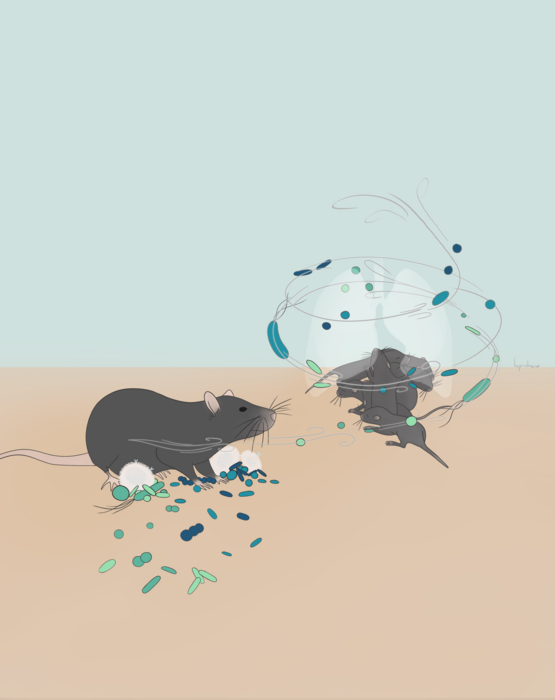A recent study led by Bruno Silva Santos, Group Leader and Vice-Director at the Instituto de Medicina Molecular João Lobo Antunes (iMM; Portugal), published in the scientific journal Cell Reports found that a specific subset of white blood cells called γδ T cells affects the transfer of the mother’s microbiota during childbirth and breastfeeding and affects the infants’ lung immune response.
 Microbiota from mothers regulates lung immunity in newborns. Image Credit: Helena Pinheiro, iMM www.hpinheiro.com
Microbiota from mothers regulates lung immunity in newborns. Image Credit: Helena Pinheiro, iMM www.hpinheiro.com
The “first breath response,” an immune response involving significant lung tissue remodeling, is caused by the replacement of the sterile liquid that fills the lungs before birth with gas during the newborn’s first breath. γδ T cells, a particular type of immune cells, have now been linked to this immune response in mice by iMM researchers.
We found that newborns born and raised by mothers lacking γδ T cells acquire a different gut microbiota. The intestinal microorganisms in these mice are not able to produce sufficient amounts of a type of molecules that are important to modulate the lung immune response to the first breath. As result, these pups have an exacerbated first breath immune response.”
Bruno Silva Santos, Study Lead and Vice Director, Instituto de Medicina Molecular João Lobo Antunes
Other settings could also be crucial to the type of immune response that is triggered following the initial breath. In response to an infection by a parasite that causes lung damage, the researchers noticed a similar trend in the offspring of mothers who lacked γδ T cells.
We saw that either antibiotic treatment to kill the microorganisms in the gut, or supplementation with short-chain fatty acids, the molecules that are down in mice with exacerbated immune responses, abolish the differences between mice born from mothers with and without these immune cells. This shows that the effects observed in the pups are indirect and linked to these molecules produced by the microbiota.”
Pedro Papotto, Study First Author and Postdoctoral Researcher, The University of Manchester
The difficulty of the work increases to a new level when it comes to the transfer of microbiota from mothers to newborns.
Papotto added, “We found that the transfer of microorganisms from mothers is not restricted to the process of birth. If pups born from mothers lacking γδ T lymphocytes are raised with mothers that have these cells, their immune response is restored. In fact, our study suggests that the majority of the bacterial communities must be transferred after birth, during nursing.”
It is widely established that factors received from mothers might affect the immune system’s development. Now, in this study, the researchers discovered that maternal γδ T cells, which were never related to this process, are engaged in the growth of the newborn’s lung immunity by having an impact on the colonization of the gut microorganism.
The growing number of studies supporting the physiological and therapeutic functions of the gut microbiota is also boosted by this.
Source:
Journal reference:
Papotto, P. H., et al. (2023). Maternal γδ T cells shape offspring pulmonary type 2 immunity in a microbiota-dependent manner. Cell Reports. doi.org/10.1016/j.celrep.2023.112074